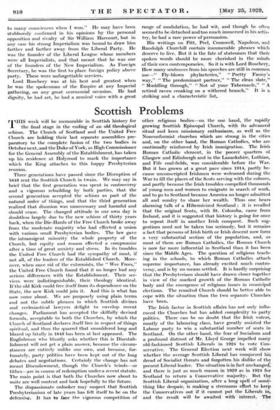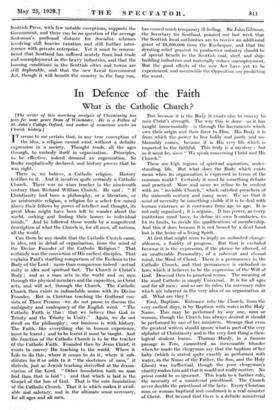Scottish Problems
THIS week will be memorable in Scottish history for the final stage in the ending of an old theological schism. The Church of Scotland and the United Free Church are holding their last separate assemblies pre- paratory to the complete fusion of the two bodies in October next, and the Duke of York, as High Commissioner 'for the General Assembly of the Establishment, has taken up his residence at Holyrood to mark the importance which the King attaches to this happy Presbyterian reunion.
Three generations have passed since the Disruption of 1848 rent the Scottish Church in twain. We may say in brief that the first generation was spent in controversy and a vigorous rebuilding by both parties, that the second generation accepted the schism as part of the natural order of things, and that the third generation realized that disunion was unnecessary and harmful and should cease. The changed attitude in our own day is doubtless largely due to the new schism of thirty years back, when the Die-Hards of the Free Church broke away from the moderate majority who had effected a union with various small Presbyterian bodies. The law gave the intransigent minority the whole property of the Church, but equity and reason effected a compromise after a time of great anxiety and stress. In its troubles the United Free Church had the sympathy of most, if not all, of the leaders of the Established Church. More- over, when once rid of the extremists, the Wee Frees," the United Free Church found that it no longer had any serious differences with the Establishment. Their ser- vices were indistinguishable, their theology identical. If the old Kirk could free itself from its dependence on the State, the new Kirk could join it. And this is what has now come about. We are purposely using plain terms and not the subtle phrases in which Scottish divines and ecclesiastical lawyers delight to envelop recent changes. Parliament has accepted the skilfully devised formula, acceptable to both the Churches, by which the Church of Scotland declares itself free in respect of things spiritual, and thus the quarrel that smouldered long and blazed up fatally in 1843 has been at last appeased. The Englishman who bluntly asks whether this is Disestab- lishment will not get a plain answer, because the circum- stances are entirely unlike our own, and because, for- iunately, party polities have been kept out of the long debates and negotiations. Certainly the change has- not meant Disendowment, though the Church's teinds—or tithes—pre in course of redemption under a recent statute. The main point is that both the Churches now about to unite are well content and look hopefully to the future.
The dispassionate onlooker may suspect that Scottish Presbyterianism of late years has felt itself to be on the defensive. It has to face the vigorous competition of other religious bodies—on the one hand, the rapidly growing Scottish Episcopal Church, with its advanced ritual and keen missionary enthusiasm, as well as the Nonconformist churches which are strong in the cities and, on the other hand, the Roman Catholics, who are continually reinforced by Irish immigration. The Irish Roman Catholic element, in the poorer quarters of .Glasgow and Edinburgh and in the Lanarkshire, Lothian, and Fife coal-fields, was considerable before the War. But it has grown at a great pace since 1914, partly be- cause unconscripted Irishmen were welcomed during the War to fill the places of the Scots serving with the colours, and partly because the Irish troubles compelled thousands of young men and women to emigrate in search of work, and to go to Scotland because America no longer admitted all and sundry to share her wealth. Thus one hears alarming talk of a Hibemicized Scotland ; it is recalled that the original Scots, with St. Columba, came from Ireland, and it is suggested that history is going for once to repeat itself in another Irish conquest. Such sug- gestions need not be taken too seriously, but it remains a fact that persons of Irish birth or Irish descent now form a very substantial section of the population, and, as most of them are Roman Catholics, the Roman Church is now far more influential in Scotland than it has been since the Middle Ages. The question of religious teach- ing in the schools, to which Roman Catholics attach supreme importance, has already excited much contro- versy, and is by no means settled. It is hardly surprising that the Presbyterians should have drawn closer together in view of the marked growth of the Roman Catholic body and the emergence of religious issues in municipal elections. The reunited Church should be better able to cope with the situation than the two separate Churches have been.
The Irish factor in Scottish affairs has not only influ- enced the Churches but has added complexity to party politics. There can be no doubt that the Irish voters, mostly of the labouring class, have greatly assisted the Labour party to win a substantial number of seats in Scotland. On the other hand, the fear of Socialism and a profound distrust of Mr. Lloyd George impelled many old-fashioned Scottish Liberals in 1924' to vote Con- servative. The General Election next week will show whether the average Scottish Liberal has conquered his dread of Socialist threats and forgotten his dislike of the present Liberal leader., The situation is in fact unchanged; and there is just as much reason in 1929 as in 1924 for Scotland to return a Conservative majority. But thc Scottish Liberal organization, after a long spell of some thing like despair, is making a strenuous effort to keep the Conservatives out if it cannot put the Liberals in, and the result will be awaited with interest. The Scottish Press, with few notable exceptions, supports the Government, and there can be no question of the average Scotsman's profound distaste for Socialist schemes involving still heavier taxation and still further inter- ference with private enterprise. Yet it must be remem- bered that Scotland has suffered acutely from bad trade and unemployment in the heavy industries, and that the housing conditions in the Scottish cities and towns are still deplorable, and that the new Local Government Act, though it will benefit the country in the long run, has caused much temporary ill-feeling. Sir John Gilmour, the Secretary for Scotland, pointed out last week that the Scottish local authorities are to receive an additional grant of 18,200;000 from the Exchequer, and that the Orating relief granted to productive industry should be of special benefit to the Scottish coal, steel, and ship- building industries and materially reduce unemployment. But the good effects of the new Act have yet to be experienced, and meanwhile the Opposition are predicting the worst.









































 Previous page
Previous page